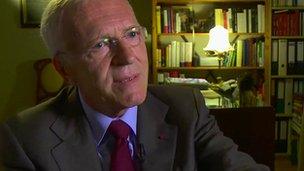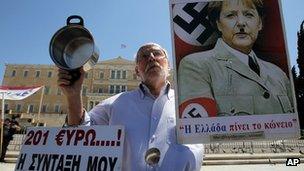Why is Germany so reluctant to take a lead in Europe?
- Published
Germany's thriving economy has put it in the driving seat of Europe, but as Allan Little reports for Newsnight, it is reluctant to drive
In December 2011, at the height of the sovereign debt crisis in the eurozone, the Polish Foreign Minister, Radoslaw Sikorski, went to Berlin to exhort his German neighbours to take clear and decisive action to lead Europe back to economic health.
"I fear German inactivity more than I fear German action," he said.
It was a remarkable moment, a moment that signalled a definitive end to generations of enmity and mutual suspicion between the two countries.
Germany's northern European neighbours expect it to take the lead in Europe, to match its economic muscle with strong political leadership.
But Germany has not sought, and does not want, this role. For in Germany, more than anywhere else in Europe, history reaches out, lays claim to the present, and shapes the future.
Last month, with election campaigning already under way, the German Chancellor Angela Merkel went to Dachau, Nazi Germany's first concentration camp. She said the experience filled her with sadness and shame.
But when a German chancellor bows her head at a place like that, it is more than a gesture of contrition, it is also a warning. She is saying: "Don't forget".
For Germans, the European Union is what delivered them from the nightmare years. European integration helped make Germany a normal European democracy. That was, in part, the whole point of the process in the early decades - to Europeanise Germany.
And so being asked to lead in Europe awakens ghosts that have long lain dormant.
"You can see the whole problem in the language, for a start," says Ulrike Guerot of the European Council on Foreign Relations in Berlin. "In German the word for leader is fuehrer, so obviously it's a no-go right away."
'Indispensible nation'
Joachim Bitterlich was former Chancellor Helmut Kohl's foreign policy adviser in the 1990s. "The Germans had always been told after World War II 'be reticent, be modest'," he says. "We were taught not to lead. We were taught to shut up. This means the Germans did not learn to lead."

Joachim Bitterlich says after the war Germans were constantly told to be modest and taught not to lead
But history has put Germany in the driving seat, whether it wants to drive or not. Its thriving economy, with industry at its heart, makes it, in Mr Sikorski's words, Europe's "indispensable nation".
Germany's unemployment is less than half the European average. It is one of the world's biggest exporters. Its books are balanced, and its national debt, which leapt up when the financial crisis hit, is now falling. In a memorable phrase coined by Britain's Economist magazine, this has made Germany Europe's "reluctant hegemon".
It is striking that in Germany's lacklustre election campaign in the run up to Sunday's poll, the question of Germany's reluctant leadership in Europe has scarcely figured.
It is partly because there is no disagreement between the parties. But it is also a measure of how uncomfortable Germans are with the very thought of it, that there is so little public discussion of it.
Eurozone unity
"The way that German politics is perceived abroad is very important for German politicians and German citizens," says Michael Wohlgemuth, director of the small independent think-tank Open Europe Berlin. "We want to be loved and not hated by others. Or feared."
"Are Germans still frightened of themselves?" I ask him. "It seems so, yes," he answers.
But whatever the outcome of this month's election, Germany's priority in the months and years ahead will be to defend the unity of the eurozone. There is a powerful cross-party consensus on that.
In return for opening its wallet to fund new bailouts, or to guarantee new loans, Germany expects something in return.
"We will pay if the rules are set and if there are some also compromises on national sovereignty," says Ulrike Guerot, "because if you want Germany in the end to pay, then Germany needs also to have decision power."
Germany will expect its neighbours to agree to a set of enforceable rules - banking union, fiscal discipline, European oversight of national budgets. For Germany the answer is always more Europe, not less; deeper integration, less national sovereignty, so that no one nation will be allowed to endanger the shared currency.
Moving on from war
Germany will not insist on this in a single Big Bang moment. But as each new crisis emerges, it will try to walk Europe down that path. So a process that began, 50 years ago, as an attempt to Europeanise Germany looks more and more - to many - like the gradual, peaceful Germanisation of Europe.

In Greece, anti-austerity protesters sometimes depict Angela Merkel with Hitler moustache
"It's obvious that to some extent Europe will be more German," Ms Guerot says.
"It is already more German and the real thing is: is this so bad?… Germany has a winning model, a very good socio-economic structure, if Germany is able to give ownership of that model to everybody then Germany has soft power, then it should be German Europe for everybody because German Europe is the only way to save social Europe."
It is what Germany's neighbours want. In that speech in Berlin in 2011, Poland's Foreign Minister Radoslaw Sikorski was saying, in effect, we Poles have at last got over the Nazis - you Germans must too.
And Germany is, by increments, emerging from the reticence of the post-war decades. It is already happening: in Greece, austerity-driven public spending cuts: in Spain, labour market reform to improve productivity.
German pride
Things get worse before they get better. Germany pays the bills and takes the blame. On the streets of Athens Mrs Merkel is depicted with a Hitler moustache.
In Berlin there is a thriving little English language comedy scene in which German comics tell gags in their second language. Stefan Danziger, who is also a tour guide, says it is still too soon to tell jokes about the Third Reich, but says this of European leaders' requests for German leadership through the current crisis:
"Now they go to Angela Merkel and say 'please help us, rule us'." he tells his audience.
"She's like 'No'. We tried twice and everybody became bitchy!" The laughter comes easily, but there is an undercurrent of nervousness in it, of self-consciousness.
Drew Portnoy is an American comic who has been in Berlin so long he is practically German, and he performs easily in both languages. Are the Germans overcoming their decades of post-war reticence? I ask him.
"Germans are not allowed to say 'I Am Proud To Be German' because that is tied to the Nazi history," he says. "So if you went into polite company with Germans and you said: 'Aren't you guys proud of being Germans?' the room would fall silent… they are glad to be German I'd say."
Watch Allan Little's full report on Germany and its role within Europe on BBC Newsnight on Wednesday 18 September 2013 at 10.30pm on BBC Two, or catch up afterwards on the BBC iPlayer and Newsnight website.
- Published10 September 2013
- Published10 September 2013